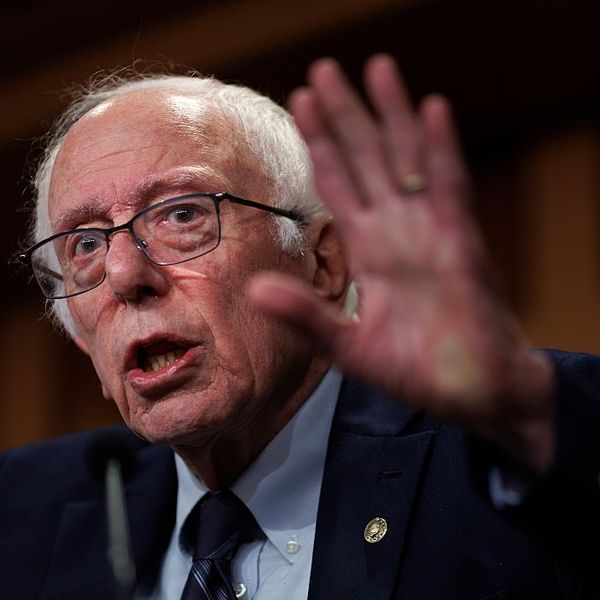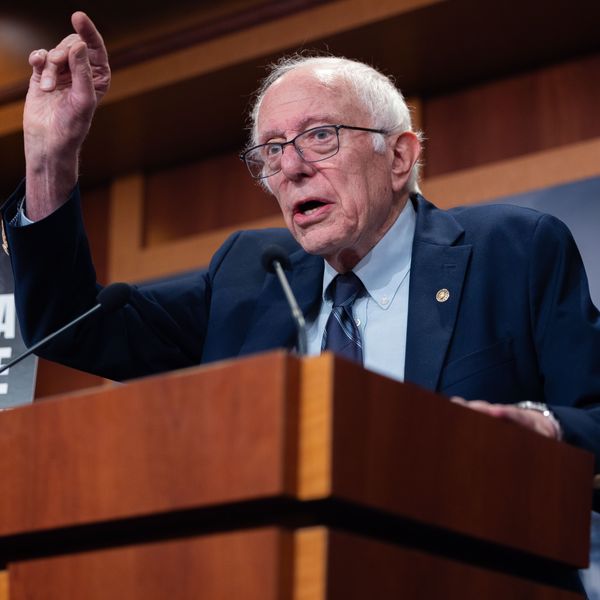
Sen. Bernie Sanders (I-Vt.) on Monday demanded that President Donald Trump keep his campaign promise to force pharmaceutical companies to lower the costs of medications. (Photo: TaxRebate.org.uk/Flickr/cc)
Sanders on Trump's Whining About Big Pharma: "Stop Just Talking About High Drug Prices... Do Something"
The senator called on the president to support legislation that would enable Medicare to negotiate prices and allow for the importation of medication from other countries
Sen. Bernie Sanders (I-Vt.) on Monday called on President Donald Trump to "stop just talking about high drug prices" and actually "do something" after the president whined on Twitter about Big Pharma raising prescription drug prices while continuing to flout his campaign promise lower costs for consumers.
Sanders tweeted:
\u201cIf you are serious about this issue, tell your Republican pals in Congress to pass bills requiring Medicare to negotiate drug prices and enabling the importation of safe, low-cost drugs from Canada and other countries. (2/2)\u201d— Bernie Sanders (@Bernie Sanders) 1531162645
The senator was responding to an afternoon tweet in which Trump referenced reports from last week that Pfizer had raised the price of several drugs for the second time this year:
\u201cPfizer & others should be ashamed that they have raised drug prices for no reason. They are merely taking advantage of the poor & others unable to defend themselves, while at the same time giving bargain basement prices to other countries in Europe & elsewhere. We will respond!\u201d— Donald J. Trump (@Donald J. Trump) 1531156109
Although Trump had vowed to take on the pharmaceutical industry during his race to the Oval Office, as Bloomberg noted Monday, "so far his most-noticed efforts have been using Twitter and stump speeches to call out pharmaceutical companies, rather than enacting major new policies."
In mid-May, the president unveiled a drug plan that critics immediately denounced as "pharma-friendly." As Common Dreams reported, "rather than allowing the government to negotiate lower drug prices--a proposal backed by 92 percent of Americans--Trump's plan vaguely promises to 'encourage innovation' in the private sector while pursuing 'reforms' to Medicare to promote 'greater flexibility.'"
As Bloomberg put it, "Five weeks ago, Trump said that drugmakers would announce 'voluntary, massive' cuts in drug prices in two weeks. So far, no such announcement from the industry has happened."
In fact, as Politico pointed out last week:
A Wells Fargo report found 104 price increases in June and the first two days of July, with an average jump of 31.5 percent and a median increase of 9.4 percent. That followed 48 increases in May. The list price hikes don't factor in discounts that companies may provide to some insurance companies and patients.
The across-the-board increases cast doubt on whether Trump and Health and Human Services Secretary Alex Azar can pressure manufacturers to voluntarily drop prices without the threat of specific consequences.
Azar responded to Trump's tweet on Monday with a declaration that "change is coming to drug pricing, whether painful or not for pharmaceutical companies," while offering no new plans to force such changes.
Meanwhile, Sanders--who has slammed Trump's drug plan as "lukewarm"--and several top congressional Democrats in October introduced actual legislation, officially titled the Medicare Drug Price Negotiation Act of 2017 (pdf), that would enable the Department of Health and Human Services to negotiate lower prescription drug prices under Medicare Part D.
An Urgent Message From Our Co-Founder
Dear Common Dreams reader, The U.S. is on a fast track to authoritarianism like nothing I've ever seen. Meanwhile, corporate news outlets are utterly capitulating to Trump, twisting their coverage to avoid drawing his ire while lining up to stuff cash in his pockets. That's why I believe that Common Dreams is doing the best and most consequential reporting that we've ever done. Our small but mighty team is a progressive reporting powerhouse, covering the news every day that the corporate media never will. Our mission has always been simple: To inform. To inspire. And to ignite change for the common good. Now here's the key piece that I want all our readers to understand: None of this would be possible without your financial support. That's not just some fundraising cliche. It's the absolute and literal truth. We don't accept corporate advertising and never will. We don't have a paywall because we don't think people should be blocked from critical news based on their ability to pay. Everything we do is funded by the donations of readers like you. Will you donate now to help power the nonprofit, independent reporting of Common Dreams? Thank you for being a vital member of our community. Together, we can keep independent journalism alive when it’s needed most. - Craig Brown, Co-founder |
Sen. Bernie Sanders (I-Vt.) on Monday called on President Donald Trump to "stop just talking about high drug prices" and actually "do something" after the president whined on Twitter about Big Pharma raising prescription drug prices while continuing to flout his campaign promise lower costs for consumers.
Sanders tweeted:
\u201cIf you are serious about this issue, tell your Republican pals in Congress to pass bills requiring Medicare to negotiate drug prices and enabling the importation of safe, low-cost drugs from Canada and other countries. (2/2)\u201d— Bernie Sanders (@Bernie Sanders) 1531162645
The senator was responding to an afternoon tweet in which Trump referenced reports from last week that Pfizer had raised the price of several drugs for the second time this year:
\u201cPfizer & others should be ashamed that they have raised drug prices for no reason. They are merely taking advantage of the poor & others unable to defend themselves, while at the same time giving bargain basement prices to other countries in Europe & elsewhere. We will respond!\u201d— Donald J. Trump (@Donald J. Trump) 1531156109
Although Trump had vowed to take on the pharmaceutical industry during his race to the Oval Office, as Bloomberg noted Monday, "so far his most-noticed efforts have been using Twitter and stump speeches to call out pharmaceutical companies, rather than enacting major new policies."
In mid-May, the president unveiled a drug plan that critics immediately denounced as "pharma-friendly." As Common Dreams reported, "rather than allowing the government to negotiate lower drug prices--a proposal backed by 92 percent of Americans--Trump's plan vaguely promises to 'encourage innovation' in the private sector while pursuing 'reforms' to Medicare to promote 'greater flexibility.'"
As Bloomberg put it, "Five weeks ago, Trump said that drugmakers would announce 'voluntary, massive' cuts in drug prices in two weeks. So far, no such announcement from the industry has happened."
In fact, as Politico pointed out last week:
A Wells Fargo report found 104 price increases in June and the first two days of July, with an average jump of 31.5 percent and a median increase of 9.4 percent. That followed 48 increases in May. The list price hikes don't factor in discounts that companies may provide to some insurance companies and patients.
The across-the-board increases cast doubt on whether Trump and Health and Human Services Secretary Alex Azar can pressure manufacturers to voluntarily drop prices without the threat of specific consequences.
Azar responded to Trump's tweet on Monday with a declaration that "change is coming to drug pricing, whether painful or not for pharmaceutical companies," while offering no new plans to force such changes.
Meanwhile, Sanders--who has slammed Trump's drug plan as "lukewarm"--and several top congressional Democrats in October introduced actual legislation, officially titled the Medicare Drug Price Negotiation Act of 2017 (pdf), that would enable the Department of Health and Human Services to negotiate lower prescription drug prices under Medicare Part D.
Sen. Bernie Sanders (I-Vt.) on Monday called on President Donald Trump to "stop just talking about high drug prices" and actually "do something" after the president whined on Twitter about Big Pharma raising prescription drug prices while continuing to flout his campaign promise lower costs for consumers.
Sanders tweeted:
\u201cIf you are serious about this issue, tell your Republican pals in Congress to pass bills requiring Medicare to negotiate drug prices and enabling the importation of safe, low-cost drugs from Canada and other countries. (2/2)\u201d— Bernie Sanders (@Bernie Sanders) 1531162645
The senator was responding to an afternoon tweet in which Trump referenced reports from last week that Pfizer had raised the price of several drugs for the second time this year:
\u201cPfizer & others should be ashamed that they have raised drug prices for no reason. They are merely taking advantage of the poor & others unable to defend themselves, while at the same time giving bargain basement prices to other countries in Europe & elsewhere. We will respond!\u201d— Donald J. Trump (@Donald J. Trump) 1531156109
Although Trump had vowed to take on the pharmaceutical industry during his race to the Oval Office, as Bloomberg noted Monday, "so far his most-noticed efforts have been using Twitter and stump speeches to call out pharmaceutical companies, rather than enacting major new policies."
In mid-May, the president unveiled a drug plan that critics immediately denounced as "pharma-friendly." As Common Dreams reported, "rather than allowing the government to negotiate lower drug prices--a proposal backed by 92 percent of Americans--Trump's plan vaguely promises to 'encourage innovation' in the private sector while pursuing 'reforms' to Medicare to promote 'greater flexibility.'"
As Bloomberg put it, "Five weeks ago, Trump said that drugmakers would announce 'voluntary, massive' cuts in drug prices in two weeks. So far, no such announcement from the industry has happened."
In fact, as Politico pointed out last week:
A Wells Fargo report found 104 price increases in June and the first two days of July, with an average jump of 31.5 percent and a median increase of 9.4 percent. That followed 48 increases in May. The list price hikes don't factor in discounts that companies may provide to some insurance companies and patients.
The across-the-board increases cast doubt on whether Trump and Health and Human Services Secretary Alex Azar can pressure manufacturers to voluntarily drop prices without the threat of specific consequences.
Azar responded to Trump's tweet on Monday with a declaration that "change is coming to drug pricing, whether painful or not for pharmaceutical companies," while offering no new plans to force such changes.
Meanwhile, Sanders--who has slammed Trump's drug plan as "lukewarm"--and several top congressional Democrats in October introduced actual legislation, officially titled the Medicare Drug Price Negotiation Act of 2017 (pdf), that would enable the Department of Health and Human Services to negotiate lower prescription drug prices under Medicare Part D.

